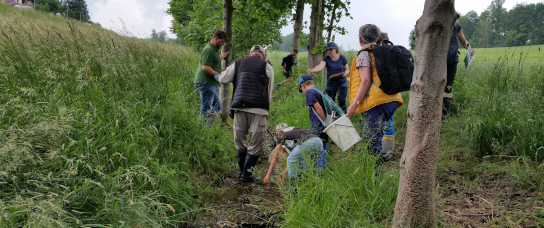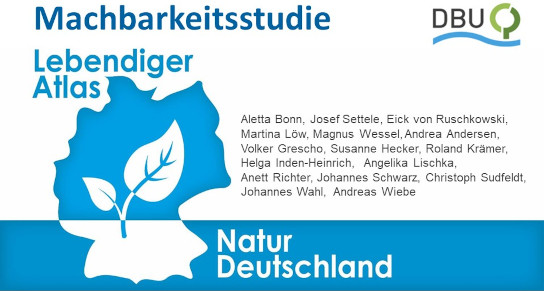Monitoring biodiversity Change through Citizen Science

Short description
Biodiversity change is one of the biggest challenges facing mankind. To understand the complex patterns of this change, ecologists are dependent on the availability of monitoring data and the development of statistical tools to analyse these data. For most organisms, the available data that can inform on past trends are a heterogeneous mix of data types of varying accessibility.
In the Biodiversity Change working group, we compile community datasets from heterogeneous data sources from agencies, natural history societies and citizen science projects on various taxa and develop and apply statistical methods to analyze them. Our questions are focused on species long-term population trends and community turnover; the geographic patterns of change and links to environmental variation, and the predictive ability of response and effect traits, and species co-occurrence patterns. Moreover, we use simulation models to assess how much (and what type of) data are needed to detect population and community changes over time as well as the ability of different analytical approaches to account for the different sorts of biases within unstructured biodiversity data.
Projects:
sMON - Analysing trends in German species data

sMon is a Synthesis Project of the German Centre for Integrative Biodiversity Research (iDiv) Halle-Jena-Leipzig. We aim at combining and harmonizing exemplary datasets of different taxa and habitats and to evaluate the potentials and limits for analyzing changes in the state of biodiversity in Germany. based on these insights, we will derive perspective for future biodiversity monitoring programs in Germany.
NFDI4BIODIVERSITY

Reliable data are an important basis for better contributions to the conservation of global biodiversity. We make them accessible.
Former Projects

Die Erfassung und die Verfügbarkeit von Biodiversitätsdaten sind wesentliche Grundlagen, um den Zustand von Natur und Umwelt besser beurteilen zu können. Es ist somit eine wichtige, gesamtgesellschaftliche Aufgabe, die sowohl von Akteuren der Zivilgesellschaft und Wissenschaft als auch der Verwaltung mit unterschiedlichen Ansätzen verfolgt wird.
Das zentrale Ziel der Machbarkeitsstudie ist die Prüfung der Möglichkeiten und Grenzen eines Vorhabens Lebendiger Atlas – Natur Deutschland. Hierfür wird eine Übersicht zu den aktuellen Citizen Science-Projekten zu Erfassung und Monitoring von Arten, Lebensräumen und Ökosystemleistungen, sowie des Kulturerbes in Deutschland erstellt. Anhand verschiedener zu entwickelnder Kriterien wird die Eignung der Projekte, die für unterschiedliche Zielsetzungen und thematische Anwendungsfelder entstanden, für das Atlas-Vorhaben untersucht.

The first ECSA Conference was held from 19-21 May 2016 in Berlin.
The ECSA Conference 2016, Citizen Science – Innovation in Open Science, Society and Policy, was aimed at policymakers, science funders, scientists, practitioners in the field of citizen science, NGOs and interested citizens.
The three-day conference showcased how both new and traditional ways of citizens working with scientists enable the transformative enhancement of science-policy and social impact, scientific advancement, scientific literacy and empowerment.
Publications (selection)
- Bruelheide, H., Jansen, F., Jandt, U., Klenke, R., Grescho, V., Bonn, A., Winter, M., (2022):
Mindestanforderungen an ein Monitoring von Gefäßpflanzenarten auf den bundesweit repräsentativen Stichprobenflächen. Minimum requirements for vascular plant species monitoring on Germany's nationally representative sample plots
Nat. Landschaft 97 (6), 289 - 299
full text (doi) - Bowler, D.E., Bhandari, N., Repke, L., Beuthner, C., Callaghan, C.T., Eichenberg, D., Henle, K., Klenke, R., Richter, A., Jansen, F., Bruelheide, H., Bonn, A., (2022):
Decision-making of citizen scientists when recording species observations
Sci. Rep. 12 , art. 11069
full text (doi) - Bowler, D.E., Callaghan, C.T., Bhandari, N., Henle, K., Barth, M.B., Koppitz, C., Klenke, R., Winter, M., Jansen, F., Bruelheide, H., Bonn, A., (2022):
Temporal trends in the spatial bias of species occurrence records
Ecography 2022 (8), e06219
full text (doi) - Bowler, D., Eichenberg, D., Conze, K.-J., Suhling, F., Baumann, K., Benken, T., Bönsel, A., Bittner, T., Drews, A., Günther, A., Isaac, N., Petzold, F., Seyring, M., Sprengler, T., Trockur, B., Vedder, D., Willigalla, C., Bruelheide, H., Jansen, F., Bonn, A., (2022):
Gewinner und Verlierer in der Libellenfauna: Veränderung der Verbreitung in Deutschland zwischen 1980 und 2016
Libellula 44 (1/2), 25 - 45 - Bruelheide, H., Jansen, F., Jandt, U., Bernhardt-Römermann, M., Bonn, A., Bowler, D., Dengler, J., Eichenberg, D., Grescho, V., Kellner, S., Klenke, R.A., Lütt, S., Lüttgert, L., Sabatini, F.M., Wesche, K., (2021):
A checklist for using Beals’ index with incomplete floristic monitoring data. Reply to Christensen et al. (2021): Problems in using Beals’ index to detect species trends in incomplete floristic monitoring data
Divers. Distrib. 27 (7), 1328 - 1333
full text (doi) - Eichenberg, D., Bowler, D.E., Bonn, A., Bruelheide, H., Grescho, V., Harter, D., Jandt, U., May, R., Winter, M., Jansen, F., (2021):
Widespread decline in Central European plant diversity across six decades
Glob. Change Biol. 27 (5), 1097 - 1110
full text (doi) - Bruelheide, H., Jansen, F., Jandt, U., Bernhard-Römermann, M., Bonn, A., Bowler, D., Dengler, J., Eichenberg, D., Grescho, V., Harter, D., Jugelt, M., Kellner, S., Ludwig, M., Wesche, K. & Lütt, S. (in review) Using incomplete floristic monitoring data from habitat mapping programmes to detect species trends.
- Eichenberg, D., Bowler, D., Bruelheide, H., Jansen, F., Jandt, U., Bernhard-Römermann, M., Dengler, J., Harter, D., Henle, K., Hofmann, S., Isaac, N.J., Kamp, J., König-Ries, B., Kraemer, R., Ludwig, M., Lueg, H., Ronnenberg, K., Schiffers, K.H., Schulte, U., Sperle, J., Stab, S., Wirth, C. & Bonn, A. (in review) Langfristige Biodiversitätsveränderungen in Deutschland erkennen - Mit Hilfe der Vergangenheit in die Zukunft schauen.
- Eisenhauer, N., Bonn, A. & Guerra, C.A. (2019) Recognizing the quiet extinction of invertebrates. Nature communications, 10, 50.
- Jansen F., Bonn A., Bowler D.E., Bruelheide H., Eichenberg, D. (2019): Moderately common plants show highest relative losses. Conservation Letters: doi: 10.1111/conl.12674
- Kelling, S., Johnston, A., Bonn, A., Ruiz-Gutierrez, V., Bonney, R., Fink, D., Julliard, R., Hochachka, W.M., Fernandez, M., Kraemer, R. & Guralnick, R. (2019) Using Semi-Structured Surveys to Improve Citizen Science Data for Monitoring Biodiversity. Bioscience, 69, 170-179.
- Kühl, H.S., Bowler, D., Bruelheide, H., Eichenberg, D., Eisenhauer, N., Guerra, C., Henle, K., Isaac, N.J.B., Jansen, F., König-Ries, B., Pe’er, G., Richter, A., Voigt, M., Wirth, C. & Bonn, A. (in prep) Effective biodiversity monitoring needs integration.
